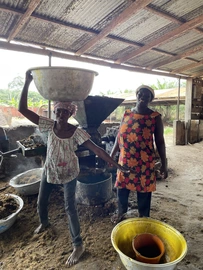Time use, technologies and well-being in Ghana
September 14, 2023.
The differences in the time men and women spend on various types of activities are often under pinned by gender and social norms. In turn, these differences have implications for men’s and women’s life outcomes such as incomes, wealth and well-being. We can see not only gendered patterns in the allocation of adults’ time; event the time use of children and adolescents are gendered. This has implications for their life outcomes including health and education. Research on patterns of men’s, women’s and children’s time use in countries of the Global South is relatively scarce, as time-use data are seldom collected. We know even less about how these differences affect the health and nutrition of different household members. We are undertaking two research projects in Ghana, Ethiopia and Uganda to fill this gap.
First study: Time-use of household members in Ghana, Ethiopia and Uganda
In a cross-country study on 'Innovations, Technology, and Time Allocation' we collected survey data from rural households in Ghana, Ethiopia and Uganda. This data includes the time that each household’s primary adult man and woman spend in various activities. Moreover, we gathered data on the time use of the eldest child above the age of 10 in each household. The analysis of this data, unsurprisingly, shows gendered patterns of time use. Men spend more time in paid work and women spend considerably more time in unpaid work while overall working hours are longer for women than for men. Similarly, girl children spend more hours in unpaid work than boys do. But, the differences in the hours that boys and girls spend in paid work are not consistent across countries. For example, in Ghana girls and boys spend a similar number of hours in paid work.
Why women’s unpaid workload is relevant
The time consumed by women’s unpaid work is of particular interest for several reasons. First: Sustainable Development Goal no. 5 on Gender Equality and Empower all Women and Girls, sets the target to ‘recognize and value unpaid care and domestic work’. Thus, an analysis of women’s time-use makes women’s work visible. Secondly: The time that women spend on unpaid work potentially impacts the diets, health and nutrition of members of the household including children. Nutrition levels are determined by many factors including food intake, food quality/quantity, nutrient absorption and retention, physical activity, and external environment including hygiene and sanitation. As the primary caretakers of children, women play a key role in these interactions. Being primarily responsible for handling, preparing and providing food and water, as well as care in addition to maintaining hygiene, the amount of time women spend on these activities has implications for children’s nutrition.
Second study: How women’s domestic work affects children
In the second, smaller project on 'Women’s Time Use, Well-being and Children’s Diets' we looked into the effects of women’s domestic and care work on child-ren’s diets and nutrition. Using data from women traders in two markets in Ghana, we have been studying the impact of women’s time use on their children’s diets. Preliminary results indicate that the days on which women traders are under more time pressure, their children consume less diverse diets. While this result highlights how significant women’s unpaid work is for children’s nutrition, these results can also be misinterpreted. They seem to suggest that if women spent more hours in domestic work their children’s nutrition status would improve. However, there are different options to address the trade-offs between women’s unpaid and paid work. In industrialized countries, domestic technologies, access to electricity and piped water have been effective in this regard. We tested this for our data and a preliminary analysis indicates that in households with access to piped water, or a lower-than-average distance to a water source, women spend fewer hours in domestic work compared to households without piped water or with a longer-than-average distance to a water source. This brings about a very small improvement in children’s dietary diversity.
Background of this research: PARI and partners
These research activities are part of the 'Program Accompanying Agricultural Research (PARI)'. PARI is committed to policy-oriented, collaborative research in partnership with other research organizations and higher education institutions. In the same spirit, these projects are collaborative research undertaken with partnerships in three countries. The Institute of Social, Statistical and Economic Research (ISSER), University of Ghana and CSIR-STEPRI are partner-institutes in Ghana. In Uganda, we are partners with the College of Agriculture and Environmental Sciences of Makerere University and in Ethiopia with the Policy Studies Institute.
Authors: Sundus Saleemi is a senior researcher at ZEF.
Contact: ssaleemi@uni-bonn.de
This article was published in ZEF News No. 47.



